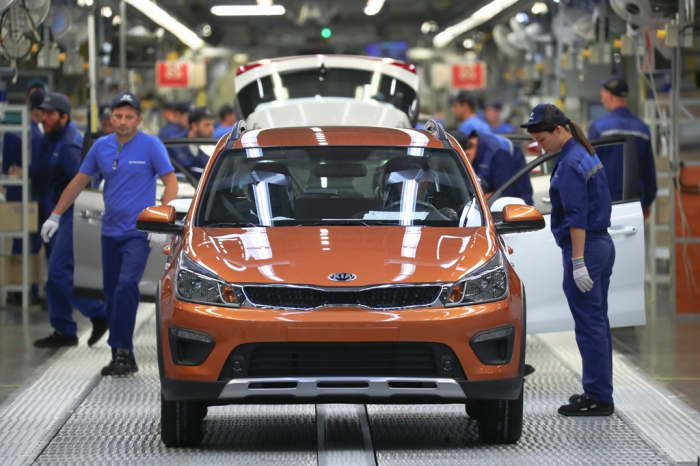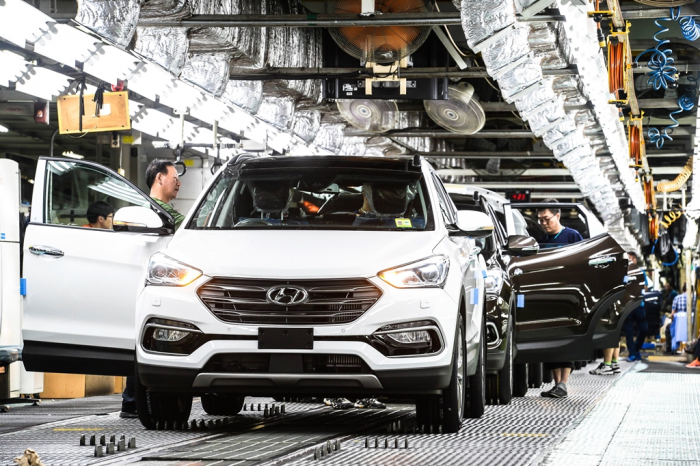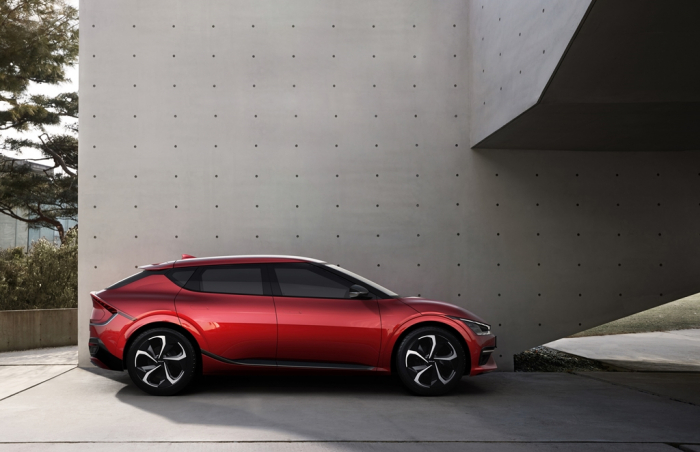Automobiles
Hyundai revs up car output amid signs of easing auto chip crunch
The global semiconductor crisis is abating but hasn't fully rounded the corner given surging demand from EV makers
By Jun 06, 2022 (Gmt+09:00)
3
Min read
Most Read
LG Chem to sell water filter business to Glenwood PE for $692 million


KT&G eyes overseas M&A after rejecting activist fund's offer


Kyobo Life poised to buy Japan’s SBI Group-owned savings bank


StockX in merger talks with Naver’s online reseller Kream


Meritz backs half of ex-manager’s $210 mn hedge fund



According to industry sources on Monday, Hyundai Motor recently set its global car output target for June at 350,000 vehicles, the company’s largest monthly production goal in four years.
The figure is close to the company’s pre-pandemic level of 347,530 units in June 2019, but still below the monthly production of 389,951 cars in June 2018.
“Hyundai and other automakers apparently see light at the end of the tunnel in this round of the global chip shortage,” said an industry official. “Also, demand is not bad despite the protracted disruptions to car production.”
Hyundai Motor has been gradually increasing its monthly car production volume since early this year. It produced 285,133 cars in January and steadily increased its output to 322,767 units in April.
The company’s global order backlog stands at about 1.3 million cars, but is gradually decreasing as it rolls out cars from its factories around the world given the rise in auto chip supply, industry officials said.

INSUFFICIENT SMART KEYS DELAY CAR DELIVERIES
Just like its global peers, Hyundai Motor Group, which also owns Korea’s second-largest automaker Kia Corp., has been unable to meet the demand for new cars from its customers largely due to intermittent plant shutdowns amid a short supply of key components, notably automotive chips.
Buyers of the Hyundai Avante, a mid-size sedan, still must wait for up to 14 months to get their car because of the insufficient supply of smart keys.
For the Casper, Hyundai’s mini-SUV, the waiting time is three months for similar reasons.
Those who want to buy Kia’s EV6, its latest electric vehicle model, must wait for at least 18 months.
Hyundai Motor said earlier this year it aims to sell over 4.3 million cars globally this year, up 10.5% from last year.
Industry officials said the global semiconductor shortage that’s bogged down the auto industry for almost two years is showing signs of easing.
Mercedes-Benz AG, Daimler Truck Holding AG and BMW AG are among carmakers now getting enough high-tech components and other automotive chips to produce at full capacity after experiencing crippling outages for months, according to a recent Bloomberg News report.

NOT YET OUT OF THE WOODS
The breakthrough comes earlier than most automakers predicted and marks a bright spot for an industry facing a worsening economy and inflation amid an industry shift toward EV production, which requires more auto chips than gasoline and diesel cars.
Analysts said some of the new availability of auto chips stems from weakening demand for consumer electronics goods, which allowed chipmakers to churn out more chips for automobiles.
According to Susquehanna Financial Group, a US brokerage, the lead time for chip deliveries remained flat at 27 weeks in May from a month earlier, compared to a year ago when chip delivery times kept increasing.
Qualcomm Technologies Inc. Chief Executive Cristiano Amon said in a recent interview with Fox Business that he expects the global chip shortage across industries to ease from the end of this year.
Auto chipmakers such as Japan’s Renesas Electronics Corp. and the Netherlands’ NXP Semiconductors N.V., which have been building new production lines since last year, are set to put them into operation next year.
But not everyone is optimistic about the current chip outlook.
Volkswagen AG, which like others estimated that the chip supply logjam would begin to ease from the second half of this year, said there’s still significant uncertainty about the coming months.
Write to Hyung-Kyu Kim, Se-Min Huh and Shin-Young Park at khk@hankyung.com
In-Soo Nam edited this article.
More to Read
-
 EarningsHyundai Motor, Kia post strong Q2 profits; Chip shortage dims outlook
EarningsHyundai Motor, Kia post strong Q2 profits; Chip shortage dims outlookJul 22, 2021 (Gmt+09:00)
3 Min read -
 AutomobilesChip shortage slams Korean carmakers’ new car rollouts
AutomobilesChip shortage slams Korean carmakers’ new car rolloutsOct 06, 2021 (Gmt+09:00)
3 Min read -
 Korean chipmakersUS survey findings on chip shortage rattle global chipmakers
Korean chipmakersUS survey findings on chip shortage rattle global chipmakersJan 26, 2022 (Gmt+09:00)
2 Min read -
 AutomobilesGlobal carmakers deliver unfinished cars due to chip shortage
AutomobilesGlobal carmakers deliver unfinished cars due to chip shortageNov 15, 2021 (Gmt+09:00)
3 Min read -
 Korean chipmakersChip shortages spread to backend firms, disrupting supply chains
Korean chipmakersChip shortages spread to backend firms, disrupting supply chainsFeb 15, 2021 (Gmt+09:00)
2 Min read -
 Korean chipmakersGM Korea to curb production as global chip shortages worsen
Korean chipmakersGM Korea to curb production as global chip shortages worsenJan 22, 2021 (Gmt+09:00)
3 Min read
Comment 0
LOG IN


